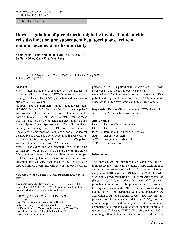摘要
Aims Proteomic study was used to clarify the mechanism of hepatocellular carcinoma (HCC) immune escape concerning Dendritic cells (DCs') dysfunction and their association with HCC invasion. @@@ Methods Human peripheral blood mononuclear cells (PBMCs) derived DCs from healthy donors were pulsed with soluble cell lysates prepared from different metastatic potential human HCC cell lines. The total protein of these DCs was analyzed by two-dimensional electrophoresis and Electro-Spray Mass Spectrometry. The allostimulatoy capacity and phenotype of these DCs were also evaluated. The clinical significance of beta-centractin, one of the largest quantitative changed spot, down-regulation in DCs was further evaluated in autologous PBMCs derived DCs pulsed with auto-tumor lysates in 26 HCC patients. @@@ Results The expression of beta-centractin was found to be considerably lower either in DCs pulsed with HCCLM6 (high metastatic potential HCC cell line) lysates, accompanied by down-regulation of CD86 molecule and impaired allostimulatory capacity, than those of DCs pulsed with lysates from HCC cell lines with low or without metastatic potential or in DCs pulsed with lysates from HCC with invasiveness than those without invasiveness. @@@ Conclusions The down-regulation of beta-centractin in DCs pulsed with high metastatic potential HCC lysates might associate with DCs dysfunction and HCC invasiveness.
- 出版日期2008-2
- 单位复旦大学
